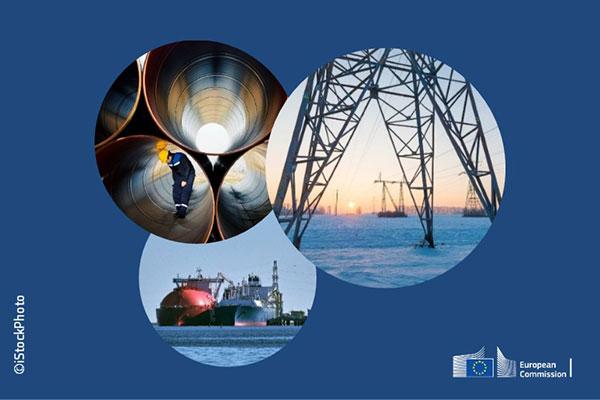EU Member States have given green light to a Commission proposal to invest €602 million of EU funds in eight cross-border energy infrastructure projects under the Connecting Europe Facility (CEF) for Trans-European Networks for Energy. This paves the way for financial aid to implement the projects in electricity, including one for smart electricity grids, CO2 networks, underground gas storage and an offshore LNG terminal. Increased cross-border interconnection of energy infrastructure is a key enabler for the European Green Deal, as it makes it easier to integrate more renewable energy into the grid. It was also a priority highlighted in the REPowerEU plan earlier this year to increase the EU’s security of supply.
The largest amount of funding worth €307.6 million is intended for an electricity transmission project. It will support the construction of a first interconnection between Italy and Tunisia with an undersea high-voltage electricity cable. This new link, called ELMED interconnector, will increase the security and the sustainability of electricity supply in Europe and will allow for better renewable energy integration and the replacement of gas-fired thermal generation, thus contributing to EU climate mitigation objectives and climate change targets.
GreenSwitch is a cross-border electricity smart grid project between Austria, Croatia and Slovenia. CEF’s support of €73.1 million for investments will serve to upgrade electricity grids to allow for the integration of an increasing number of new users (renewable energy production, heat pumps, electric vehicles), to optimise grid operation via digitalisation and to make full use of complementarities in terms of seasonal loads between the three countries. In Ireland, the Hydroelectric Power Station Silvermines will receive €4.3 million for studies to set up a hydroelectric pumped storage at a historic mining site that will help reduce price volatility, contribute to market stabilisation and increase the flexibility resource of the island’s electricity system.
Two further projects will also receive support from CEF to help replace Russian gas supply in line with REPowerEU objectives. The underground gas storage facility in Bilciurești, in Romania, is set to receive €38 million for expansion works. This will significantly help Romania and the region to reduce dependence on Russian gas imports during peak consumption observed in winter by increasing storage capacity and its overall flexibility. The liquefied natural gas (LNG) terminal in Gdansk, in Poland (€19.6 million), is also a project eligible to receive funding to finance studies for its offshore part. In the context of the Russian invasion of Ukraine, the project will improve security of supply and independence from Russian gas, as well as contribute to increasing the availability of LNG for Poland and the wider region.
Reflecting the importance of investments in decarbonisation to achieve climate neutrality in 2050, three proposals concerning the capture and storage of industrial CO2 have also been selected for funding:
- The Antwerp@C CO2 Export Hub is set to receive €144.6 million to develop the necessary infrastructure in the port of Antwerp, in Belgium, to enable industrial users in the area to transport, liquefy and export their emitted CO2 to permanent storage sites.
- The Ghent Carbon Hub, also in Belgium, will be awarded €9.6 million for studies aiming for the development of a CO2 liquefaction terminal in Ghent as well as CO2 pipelines connecting it to industrial emitters in the region.
- The D’Artagnan Dunkirk CO2 Hub, in France, will receive €5.2 million in financing for studies concerning infrastructure in the Dunkirk harbour to collect CO2 from various emitters and to liquefy it before its export to permanent storage sites.
Today’s announcement follows the call for projects earlier this year, the evaluation by the Commission and a positive vote by Member States on the Commission’s proposal in the CEF Coordination Committee, which took place on 7 December 2022. The formal adoption of the decision will follow in the coming weeks.
Background
Every two years, the Commission adopts an EU list of Projects of Common Interest (PCIs). These projects are eligible for a CEF Energy grant for studies or works. To be selected as a PCI, infrastructure projects must have a significant benefit for at least two EU countries and must increase competitiveness, enhance the EU’s energy security, and contribute to sustainability.
In the period 2014-2020, CEF Energy allocated €4.7 billion to studies and works supporting the implementation of 107 PCIs. In the period 2021-27, €5.35 billion are available for CEF Energy.

